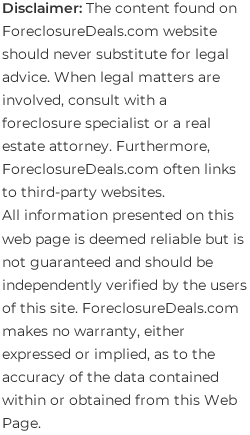Buy foreclosed houses.We have more than 1.5 Million properties available for you!

One of the biggest obstacles to buying a home is finding home financing for your purchase. Buying a home is a significant financial investment, after all, and financing is often the first major hurdle many prospective buyers encounter in the home-buying process.
Fortunately, borrowing for a home is not as complicated as it appears to be. In fact, much of the trouble with financing involves merely understanding the process and a few key points. Here is a guide to home financing for a mortgage loan that will cover finding finance companies and lenders, using a mortgage broker, the importance of the interest rate, government loans, and other vital details.
Getting Started
The first task involved with financing a home loan is taking a look at the financing process and at the financial situation of the individual or couple involved.
In the mortgage loan process, the lender - a finance company, credit union, or bank - will request a certain amount of information from the individual or couple applying for the loan. This is in an effort to determine the credit-worthiness of the applicant, to ensure the bank does not put itself at risk loaning tens of thousands to hundreds of thousands of dollars.
As a result, much will depend on the credit score of the buyer. Before you get to that point, though, you will need to provide a certain amount of information, such as:
- Gross monthly income (with supporting pay stubs)
- Federal W-2 forms going back two years
- Social Security number
- Current place of employment
- Past employment going back at least two years
- Last two months records for any additional assets (stocks, bonds, properties, etc.)
- CPA-certified proof of income letter for self-employed individuals
There may be additional documentation desired for your loan; if so, your mortgage broker will tell you.
In conjunction with this, your broker will request your credit score and report from credit reporting agencies. To help your chances, take time to boost your score as much as possible. Pay off old debts. Reduce the amount of outstanding debt you currently have. If you have too many lines of credit, close the newest ones. Clear up any outstanding collections or errors on your report.
You can also further your case by getting pre-approved first for the particular price range that you desire. In fact, these days most banks can do online pre-approval based off of basic information you supply them.
Borrowing from a Lender
Now that you have begun the initial process to obtain a loan, you can move forward with shopping around for the best possible deal for you and your family. There are multiple lenders available, all with various rates and other incentives.
Finding Lenders with the Best Rates
One key factor in which lender you choose is the interest rate. We will discuss how to obtain the best interest rate later, but for now, it is important to understand that rates do vary from lender to lender - and the difference can result in a lot of money saved (or spent) each month and every year.
Interest rates are determined by taking the index rate - which is tied to an index used by the bank to determine how much it costs the bank itself to lend - and adding margin. This is why different lenders have different rates. Many banks use a prime rate - the Federal funds rate plus 3% - for lending. Your mortgage broker is an invaluable asset when it comes to helping you find the best rates.
Preferred Lenders
If you are building a home, or buying from a builder, sometimes the builder has a preferred lender - a lender with which they have a close relationship. Often using this preferred lender gives you access to lower rates, credits toward closing costs and other fees, or other incentives. You are by no means required to use a preferred lender, but it is worth checking to see if it is advantageous for you to use one if so available.
The Advantage of Pre-Approval
Being pre-approved for a mortgage loan helps you in several ways, most notably with locking in rates and with helping "sell" you to the seller of the home you eventually want to buy.
For sellers, pre-approval means that the buyer has been vetted thoroughly by a bank and has great credit. This is far more of a guarantee that the sale will actually go through; if it doesn't, the seller wastes time and money.
Being pre-approved also helps you lock in certain interest rates offered by your bank. For example, if the interest rate now is at an all-time low, you can lock it in and use that rate for your loan over a certain period of time (often 30 to 60 days) in order to buy your home. This helps you in case the interest rate rises while you are looking.
Continuing the Process
Also be on the lookout for the type of loan you wish to take out, be it a 30-year fixed-rate mortgage or a 15-year adjustable-rate mortgage. Talk with several lenders to see what options they offer. You may also want to look into government loans, such as FHA loans and VA loans. These loans are guarantees from the federal government that ensure the bank of payment in case you default on your loan. They allow you to obtain a home with a much lower down-payment, and often have other advantages as well.
Check with your mortgage broker to see if you apply if government loans interest you.
Additionally, don't be afraid to check out credit unions for your loan. Credit unions, due to their restricted membership, often have great deals for their members and can sometimes work with you to help you finance your home purchase when banks would otherwise say no. If you are not a member of a credit union, it is often free or very inexpensive to join, and most people meet qualifications for one credit union or the other.
Getting the Best Interest Rates
It is vital that you obtain the best interest rate possible; otherwise, you could see your monthly payment rise higher than it should - which means you pay a ridiculous amount of interest over the entire life of the loan.
Shopping Around
The best way to obtain the best rates is to shop around, plain and simple. Mortgage brokers, as mentioned, are highly valuable assets to use in this search. They do make commission, and are in the business to make a profit, but this is to be expected, and they profit only if you are satisfied with what they find for you. Using mortgage brokers is just like using a buyer's broker in the home-buying process - someone who is working for you to help you financially with the purchase.
Getting Information Quickly
One very important part of obtaining the best interest rates is gathering your information quickly from various lenders - on the same day, preferably, since price quotes change rapidly. You do not want to wait too long because the great deal you had one day could very well be gone the next. Using the Internet is a must for this type of search.
Lending Points
Now we will get into the technical aspects of interest rates, lending points, and down payments - and how they all interact with one another to determine how much, ultimately, you will pay for financing your loan.
For starters, points are percentages of your overall loan amount. One point is equal to one percent of the loan amount, so for a $150,000 home, a point is worth $1,500. Points are used between the buyer and the lender to determine how expensive the loan will be.
You can opt to purchase points, which lower your interest rate but costs you more money up front. For example, it would cost you $1,500 to lower your interest rate (on a 30-year mortgage) by 0.125 percent. If you have a 4% interest rate, your new interest rate would be 3.875%.
If you want the best interest rate for the long term, and you plan on staying in the house for a significant amount of time, it may be in your best interest to purchase mortgage points to lower your effective interest rate. If you are a short-term investor, however, you may want to use the higher rate and avoid paying for mortgage points - or even offer to "sell" points back to the lender in exchange for cash up front.
Down Payments
The down payment also impacts how much you will pay in interest, since the percentage is applied to the outstanding principal of the loan.
For example, if you finance a $120,000 home at 4% interest, but put down a $20,000 down payment, you are paying 4% on $100,000. That comes out to roughly $477 a month (with $333 of that in interest paid). If you make a much-larger down-payment, like $40,000, it lowers your monthly payment to roughly $382, with $267 in interest paid. Likewise, if you didn't pay anything down, your monthly payment would be $572 with $400 in interest.
Conclusion
In the end, financing a home loan is not as complicated as it may seem for many. The process can be daunting, but with the right guide and the right help, borrowing for a home loan is easier than you think.
How to Buy Foreclosure Homes: Beginners Guide
Along with giving you tips on how to buy foreclosure homes, this video explains the foreclosure process, the foreclosure laws and the benefits of buying a foreclosure to first-time homebuyers. Among these tips are pre-qualifying for a loan, hiring...Find Foreclosed Homes for Sale in the Most Active States
- California
- Florida
- Texas
- New York
- Michigan
- Arizona
- Illinois
- Georgia
- North Carolina
- Nevada
- Pennsilvania
- Colorado
Find Foreclosed Homes for Sale in the Most Active Counties
- Broward, FL
- Queens, NY
- Westchester, NY
- Dade, FL
- Santa Clara, CA
- Palm Beach, FL
- Wayne, MI
- Clark, NV
- Harris, TX
- Tarrant, TX
- Maricopa, AZ
- Cook, IL
Find Foreclosed Homes in the Most Active Cities


